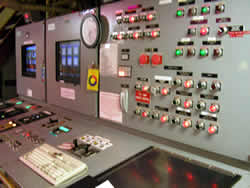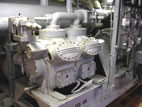
 |
| |
||||||||||||||||
|
||||||||||||||||||||||||||||||||||||||||||||||||||||
 Part of main control panel in the R/V Atlantis Engine Room. (click image for larger view) |
The engineers of R/V Atlantis operate a control room down in the heart of the ship. Within the engine room they power and monitor facilities for crew and scientists to maintain an environment comparable to a small city at sea. Chief Engineer Chris Morgan, First Assistant Engineer Mike Thorwick, Second Assistant Engineer Todd Meeker, Third Assistant Engineer Mike Spruill, Oiler Alex Taylor, Oiler Paul Ruh, and Electrician Deane Lindbloom compose the operational group of the vessel's engineering services system. Several essential services provided besides powering the vessel through the water are: two washing machines, three dryers, freezers for food in storage, kitchen facilities, trash disposal and incinerator, three large air-conditioners, and two water purification systems.
A water system is essential as the ship could not easily store the amount of water used for a typical expedition. One method used to produce clean water is evaporation and condensation under a vacuum using waste engine heat (the heat generated from powering the diesel engines) as energy. The second method is reverse osmosis. Osmosis is possible by operating between eight-hundred and nine-hundred pounds of pressure using a fiberglass membrane to filter out impurities in sea water. The water created is cleaner than most city water.
The hull of R/V Atlantis houses ten diesel fuel tanks, the volume carried is replaced by seawater as it is used to maintain vessel stability. The R/V Atlantis is powered by six diesel electric generators, which drive the vessel's thrusters and provide ship services. The generators run large DC motors powering the dynamic positioning system using thrusters instead of a fixed shaft. Dynamic positioning system allows the vessel optimal stability for launching ROV Jason or DSV.
Safety is critical at sea and double and even triple redundancy for power controls allows full operation of R/V Atlantis from the control room in emergency scenarios. Besides normal engine operating duties, the engineers must each complete a one-week fire rescue course, while the electrician and oilers must attend a three day fire rescue course. In the case of a diesel fire, a carbon dioxide supply enables the smothering of all oxygen in the engine room to prevent disaster. The ship’s engineers are a key part of the safe operation of this research vessel.
|
Sep/Oct 2004
| ||||||
| S | M | T | W | T | F | S |
| 12 | 13 | 14 | 15 | 16 | 17 | 18 |
| 19 | 20 | 21 | 23 | 24 | 25 | |
| 26 | 27 | 28 | 29 | 30 | 1 | 2 |
Today's Events:
AUV Dive #3 (aborted due to transducer leak)
OBH moorings
Gravity core
|
Today's
photos |
|
click
caption for larger view |
 One of Atlantis air control systems.. |
| NeMO Home |About NeMO | Expeditions | NeMO Net | Explore | Dive! | Education |